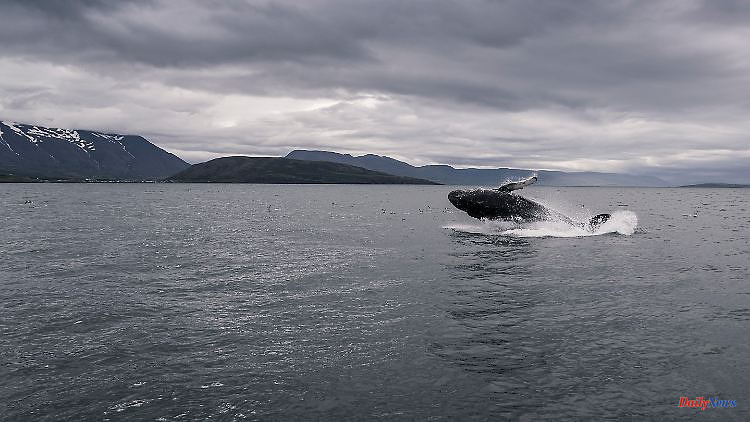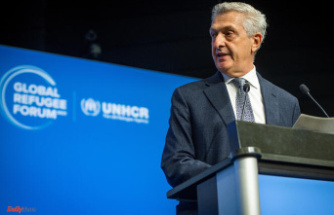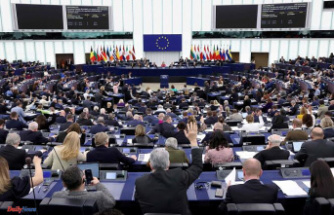Humpback whales, ocelots, elephants: for 50 years, the Washington Convention on the Protection of Endangered Species has saved many animals from extinction. To ensure that this remains the case, participating states should take stronger action against poaching. In addition, companies, for example for leather, should pay higher taxes in the future.
In view of the dramatic decline in biodiversity, environmentalists are calling for more action on the 50th anniversary of the signing of the Washington Convention on International Trade in Endangered Species (CITES). According to the CITES secretariat, more financial incentives are needed to encourage residents to protect the species in their area. Above all, companies that benefited from trading in wood, fragrances or leather should be asked to pay more, said CITES Secretary General Ivonne Higuero in Geneva. In addition, governments must prevent poaching and smuggling more consistently.
The agreement was signed on March 3, 1973 to protect endangered animal and plant species from uncontrolled trade. "African elephants, ocelots, humpback whales and scarlet macaws would probably have been extinct today if CITES hadn't pulled the ripcord," said Sandra Altherr from the organization Pro Wildlife.
"The cosmetics and healthcare industries, the luxury goods industry, timber companies - everyone must invest more in sustainability," Higuero demanded. She is in conversation with many about it. "Those using the resources and benefiting from them should pay more." It is about direct support for the local people. Most of the species to be protected are found in the poorest countries in the world. Governments should also give more money: "If the whole world benefits from species protection, everyone should pay."
Around 40,000 animal and plant species are now listed in the annexes to the agreement. Commercial trade in specimens from the wild is then either prohibited or only possible with a license if species protection is guaranteed. The lists are constantly being added to, and last year dozens of shark and ray species were added. Sea turtles, whales, rhinos, orchids and certain tree species are also listed. The 183 CITES members can impose a trade ban and order an investigation if there is concern about the population of a species.
The environmental foundation WWF speaks of a "success story of international environmental diplomacy". But she calls for more decisive action against poaching. "Otherwise, our species protection successes will fall victim to crime," said Arnulf Köhnke from the WWF. Pro Wildlife demands more speed: "If we want to save global biodiversity from overexploitation, we need more speed and precautionary, comprehensive decisions instead of - as is currently the case - tedious and controversial debates about the protection status of individual species," said Altherr.
The measures taken to protect the vicuña, a South American species of camel, and the Nile crocodiles are seen as a CITES success. Stocks recovered due to trade bans. Andean residents are now selling vicuna wool sustainably, and Nile crocodiles, whose leather is popular, can sometimes be hunted again. On the other hand, tigers, rhinos and some elephants are still threatened by poaching.
International cooperation is also becoming more difficult among CITES countries, which Higuero observes with concern. South African countries are frustrated when it comes to elephants. "They say: We have the resources, but the others determine how we use them." They demand - so far in vain - the release of some elephant populations for commercial trade. Some threatened to withdraw from CITES, Higuero said. "We then say to governments, 'Who do you want to trade with? Virtually all other countries are subject to CITES obligations.'"
The International Council for Game and Wildlife Conservation (CIC) and the German Hunting Association (DJV) say controlled hunting helps preserve species. For example, because indigenous peoples could then secure their livelihood. Legal hunting of polar bears accounts for only a fraction of natural mortality. In the case of the Inuit living in northern Canada, however, the sale of a hunting license generates between 30,000 and 40,000 US dollars "into the municipal treasury of an otherwise low-income region," according to CIC-Germany. Such funds are usually invested partly in the protection of habitats and wildlife.
In the fight against poaching, Higuero sees the growing cooperation between countries of origin, transit and destination as a success. In addition, Germany in particular is supporting many countries in training wildlife guards and setting up management authorities. The CITES Secretary General called for tougher penalties for poaching. Usually only the henchmen who hunt or cut down trees are caught. The strings would be held by others. "We have to get the big ones," she said.












